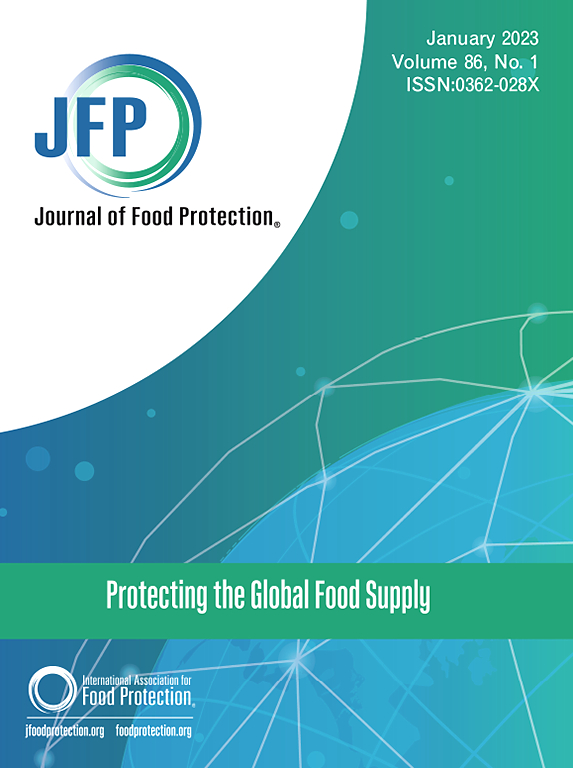提高超高温牛奶质量:使用 BD BACTEC™ FX 系统检测微生物污染的新方法。
IF 2.1
4区 农林科学
Q3 BIOTECHNOLOGY & APPLIED MICROBIOLOGY
引用次数: 0
摘要
食品行业对有效检测方法的需求仍然至关重要,以确保超高温(UHT)牛奶的安全和质量。传统的微生物检测技术耗时耗力,因此需要一种快速灵敏的方法来检测超高温牛奶中微生物的生长情况。本研究评估了 BD BACTEC™ FX 系统检测 UHT 牛奶样品中微生物的功效。该系统利用内部荧光 CO2 传感器检测培养液中生长的细菌的代谢活动。调查包括两个阶段:在 UHT 牛奶样品中添加不同种群水平(从 0 到 4.0 log10 CFU/mL)的芽孢杆菌的实验室对照实验,以及对商用 UHT 牛奶的工业规模评估。微生物检测系统在培养 13 小时后检测到接种到 UHT 牛奶中的最低芽孢杆菌数量(0 log CFU/mL)。13 小时的培养期也足以检测出商业 UHT 牛奶样本中的微生物污染。结果表明,与传统方法相比,该系统具有更高的灵敏度,能在更短的时间内(6-13 小时)检测到微生物污染。污染物的分类鉴定显示,UHT 商业样本中存在纤维单胞菌属和肠球菌属。这些发现强调了强大的检测技术在确保 UHT 奶制品安全和质量方面的极端重要性。本文章由计算机程序翻译,如有差异,请以英文原文为准。
Enhancing Ultra-High Temperature Milk Quality: A Novel Approach to Microbial Contamination Detection Using the BD BACTEC™ FX System
The demand for effective detection methods to ensure the safety and quality of Ultra-High Temperature (UHT) milk remains crucial in the food industry. Traditional techniques for detecting microorganisms are time-consuming and labor-intensive, leading to a need for a rapid and sensitive method for detecting microbial growth in UHT milk. This study evaluates the efficacy of the BD BACTEC™ FX system for microbial detection in UHT milk samples. The system utilizes internal fluorescent CO2 sensors to detect the metabolic activity of bacteria growing in the culture broth. The investigation comprises two stages: a controlled laboratory experiment with UHT milk samples spiked with Bacillus spizizenii inoculated at different population levels (from 0 to 4.0 log10 CFU/mL), and an industrial-scale assessment of commercial UHT milk. The microbial detection system detected the lowest B. spizizenii count (0 log CFU/mL) inoculated into UHT milk after 13 h of incubation. The 13-hour incubation period was also sufficient to detect microbial contamination in commercial UHT milk samples. Results indicate that this system offers heightened sensitivity compared to conventional methods, detecting microbial contamination in a significantly shorter time frame (6–13 h). Taxonomic identification of contaminants revealed the presence of Cellulomonas spp. and Enterococcus spp. in UHT commercial samples. The findings emphasize the critical importance of robust detection techniques in ensuring the safety and quality of UHT milk products.
求助全文
通过发布文献求助,成功后即可免费获取论文全文。
去求助
来源期刊

Journal of food protection
工程技术-生物工程与应用微生物
CiteScore
4.20
自引率
5.00%
发文量
296
审稿时长
2.5 months
期刊介绍:
The Journal of Food Protection® (JFP) is an international, monthly scientific journal in the English language published by the International Association for Food Protection (IAFP). JFP publishes research and review articles on all aspects of food protection and safety. Major emphases of JFP are placed on studies dealing with:
Tracking, detecting (including traditional, molecular, and real-time), inactivating, and controlling food-related hazards, including microorganisms (including antibiotic resistance), microbial (mycotoxins, seafood toxins) and non-microbial toxins (heavy metals, pesticides, veterinary drug residues, migrants from food packaging, and processing contaminants), allergens and pests (insects, rodents) in human food, pet food and animal feed throughout the food chain;
Microbiological food quality and traditional/novel methods to assay microbiological food quality;
Prevention of food-related hazards and food spoilage through food preservatives and thermal/non-thermal processes, including process validation;
Food fermentations and food-related probiotics;
Safe food handling practices during pre-harvest, harvest, post-harvest, distribution and consumption, including food safety education for retailers, foodservice, and consumers;
Risk assessments for food-related hazards;
Economic impact of food-related hazards, foodborne illness, food loss, food spoilage, and adulterated foods;
Food fraud, food authentication, food defense, and foodborne disease outbreak investigations.
 求助内容:
求助内容: 应助结果提醒方式:
应助结果提醒方式:


